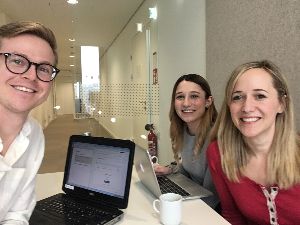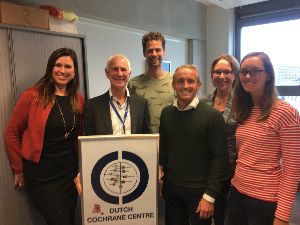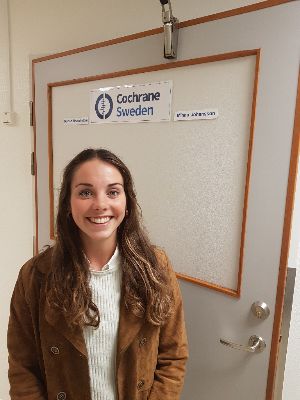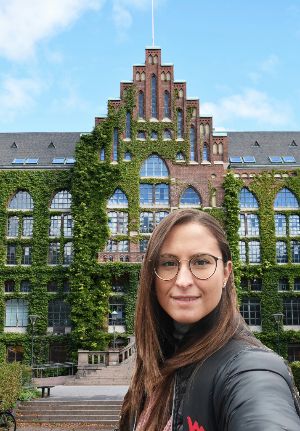
In 2017 Cochrane Sweden started the Cochrane International Mobility Programme to promote training periods at Cochrane Centre’s in other countries. Modelled on the European student exchange program, Erasmus, the scheme being trialed is global with opportunities across the Cochrane Network. The original aim was for the scheme to be for students, but any member with a wish to try a new country and experience a different environment is welcome to participate.
The scheme is the idea of Matteo Bruschettini, Centre Director of Cochrane Sweden. He tells us more about this in this short interview.
Tell us about yourself
I’m a neonatologist working at Lund University, where I am an associate professor of pediatrics. I first learned about systematic reviews in 2010-11, when I attended a master’s course at Instituto Mario Negri in Milan. Soon afterwards, I started to prepare my first Cochrane review, mainly in neonatology. Since its launch in 2017, I have worked part-time as Cochrane Sweden’s director.
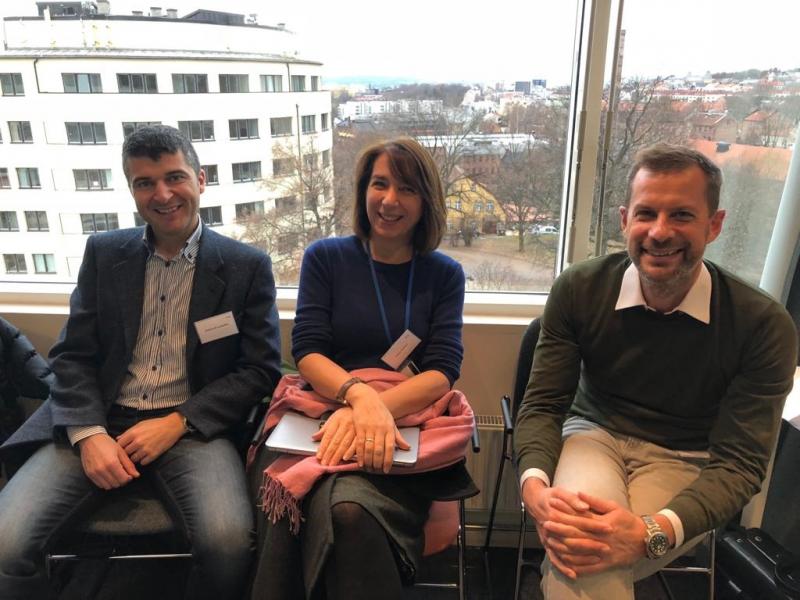
Above from left to right: Matteo Bruschettini (Director of Cochrane Sweden), Claire Glenton (Director of Cochrane Norway), Karsten Juhl Jørgensen (Acting Director of The Nordic Cochrane Centre).
Can you tell us about the Cochrane International Mobility programme (CIM)?
It is an initiative which Cochrane Sweden launched at the end of 2017 to promote training periods at Cochrane Centres in other countries. It is a kind of Cochrane Erasmus program and is not limited to Europe only. It is for everyone engaged in health research. Though the original aim was for the program to be for students, anyone else with an interest in Cochrane and our work is welcome to participate in the program.
How did it come about?
Well, the idea came to me as I wanted to enrich the training of medical students and to promote international relationships between Cochrane Centres, in line with the Cochrane principles. So, we figured out a kind of Cochrane-Erasmus initiative. A few months after the launch of Cochrane Sweden (May 2017), we explored the possibility of offering high-quality training to the medical students coming to our Centre for a 20-week research period during their last year at medical school. The first experience involved Petter who spent 4 weeks in February 2018 at Cochrane Austria. This Centre was involved because of our ongoing collaborations and because of language needs, (Petter is fluent in German). It worked very well; Petter has published two systematic reviews (one with Cochrane Austria and one with Cochrane Sweden), introduced other medical students to Cochrane, and attended the last Colloquium contributing to a presentation on how to engage medical students.
What has happened so far?
In September 2018, a colleague of Petter; Kevin, contacted me and enquired about participating in a similar program. Kevin has spent three weeks at Cochrane Netherlands and in collaboration with them, we, with Kevin, are currently completing a Cochrane review. In February 2019, another student called Sandra will start her 20-week period at Cochrane Sweden. She will spend four weeks in Denmark working with the Cochrane Anaesthesia, Critical and Emergency Care Review Group.
In March 2019, Chiara will move from Italy to Cochrane Sweden, where she will spend 3 months training and conduct two reviews with us. All these 4 students are involved in projects in neonatology, which is my main research area. However, we are open to different topics as well.
What are you hoping might happen next?
We, at Cochrane Sweden, are going to prepare an abstract for the Santiago Colloquium 2019, ideally in collaboration with the all the Cochrane centres and groups involved in the program so far. Our aim is to share our initiative and experience with others in Cochrane to inspire them to consider doing something similar. We would like to foster new partnerships for us with others in Cochrane. So, my ‘take-home message’ from this interview would be to encourage others to consider joining these international placements and to get in touch with me.
At Cochrane Sweden we are proud of the enthusiastic feedback we have received from the students so far. Moreover, this also supported staff from different Cochrane centres in building relationships and collaborating on research. We’re delighted to have started further conversations with Cochrane Poland, Cochrane Croatia, Cochrane South Africa, Cochrane Australia, Cochrane Norway and Cochrane Effective Practice and Organisation of Care (EPOC) Group .
We just find it important to share this knowledge with others in Cochrane to create awareness about this initiative and share our experiences also.
How can people interested in this program fund an exchange?
So far, no funding has been allocated to support the program. Cochrane Austria and Cochrane Netherlandsprovided training and supervision for free to the Swedish medical students. The same will apply for the Italian student coming to Cochrane Sweden and the Swedish student going to Denmark. Swedish students received a small travel grant from Lund University; the Italian student will benefit from an Erasmus Plus grant (to cover a small part of the costs). Cochrane Croatia is considering providing accommodation for free. We would like for this to become a global initiative that is aligned with our organization, which is a global collaboration with researchers from around the world. It shouldn’t be limited to Europe. Currently, we at Cochrane Sweden do not have the resources to undertake an exchange program for all of Cochrane and it would be great if this initiative might grow in to an established Cochrane program sometime in the near future.
Who can get involved?
So far, nothing is set in stone and we tailor each program for the students. The initiative is not connected with anyone from Students4Evidence, but we should look at how a relationship could develop. We are looking forward to sharing these first experiences at the Colloquium in Chile and then to be able to better define how CIM might function and develop further.
How can people get in touch with you?
Any staff member at Cochrane Sweden can be easily contacted here.
In the future, Cochrane Task Exchange might be used to facilitate and promote CIM.
Petter Brattström enjoying Cochrane Austria:
Kevin Bengtsson (third from right) during his 3 week @cochranetrain experience at Cochrane Netherlands:
Sandra Nylander Vujovic ready to start at Cochrane Sweden:

